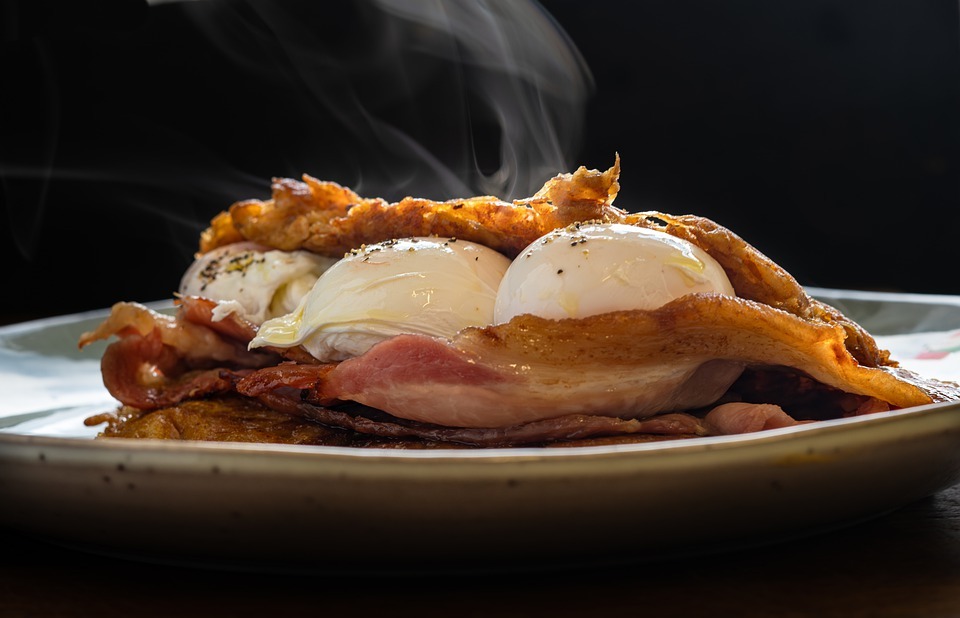The allure of crispy bacon is undeniable, but can your beloved feline friend partake in this savory treat? While the temptation to share a sliver of bacon with your cat may be strong, it's crucial to understand the potential risks and benefits before indulging their curiosity. This comprehensive guide explores the nutritional aspects of bacon, potential health hazards for cats, and offers alternative options to satisfy their palate.
Part 1: Unpacking the Nutritional Content of Bacon

1.1 A Macro Breakdown: The Fatty Truth
Bacon's nutritional profile is dominated by its high fat content. A typical 100 grams of cooked bacon boasts approximately 50 grams of fat, primarily saturated and unsaturated fats. While some fats are essential for feline health, this quantity far exceeds a cat's daily requirements.
- Saturated Fat: Predominantly found in animal products, saturated fat should be limited in a cat's diet. It can contribute to cardiovascular problems, including heart disease, and hinder digestion.
- Unsaturated Fat: Essential for healthy skin and fur, unsaturated fats are found in both animal and plant sources. While a moderate amount is beneficial, bacon's high fat content skews the balance towards potential harm.
1.2 Protein: A Cat's Essential Fuel
Bacon does provide a respectable amount of protein, offering roughly 10 grams per 100 grams of cooked bacon. Protein is crucial for cats, playing a vital role in muscle growth, tissue repair, and overall health. However, it's important to note that while bacon offers protein, it's not a balanced source of all essential amino acids required for a healthy cat.
1.3 Carbohydrate Content: A Cat's Carb Conundrum
Cats are obligate carnivores, meaning their bodies are designed to thrive on a diet rich in animal protein and fat. They have limited ability to digest carbohydrates efficiently, and bacon's negligible carbohydrate content (less than 1 gram per 100 grams) doesn't pose a direct issue, but it also doesn't provide any nutritional benefits.
Part 2: Exploring the Hidden Dangers of Bacon for Cats

2.1 Pancreatitis: A Painful Inflammation
The high fat content in bacon can trigger pancreatitis, a painful inflammation of the pancreas. This condition can be life-threatening, characterized by intense abdominal pain, vomiting, diarrhoea, and lethargy. If your cat exhibits these symptoms, immediate veterinary attention is crucial.
2.2 Obesity: A Gradual But Serious Threat
Cats are naturally prone to weight gain, and bacon's high fat content can exacerbate this tendency. Obesity leads to a multitude of health problems, including diabetes, joint issues, heart disease, and reduced life expectancy. Maintaining a healthy weight is essential for your cat's well-being.
2.3 Salt Toxicity: A Silent Threat
Bacon is notoriously high in sodium. Ingesting excess sodium can cause salt toxicity in cats, leading to a range of symptoms like increased thirst, vomiting, diarrhoea, lethargy, and seizures. In severe cases, salt toxicity can be fatal.
2.4 Digestive Discomfort: An Upset Stomach
The high fat content and challenging digestibility of bacon can lead to digestive distress in cats. This often manifests as vomiting, diarrhoea, gas, and bloating. Your cat's gastrointestinal system is not equipped to handle such a heavy load of fat.
2.5 Food Allergies: A Potential Trigger
Some cats may have allergies to pork, the main ingredient in bacon. Symptoms of a food allergy can include itching, skin rashes, ear infections, vomiting, and diarrhoea. If you suspect your cat may be allergic to pork, consult your veterinarian.
Part 3: Nutritional Delights: Alternatives to Bacon
3.1 Commercial Cat Food: Tailored Nutrition
High-quality commercial cat food offers a balanced and complete diet specifically designed to meet a cat's nutritional requirements. These foods provide the right balance of protein, fat, carbohydrates, vitamins, and minerals to support optimal health.
3.2 Cat-Friendly Treats: A Taste of Indulgence
A variety of cat-friendly treats are available that are both safe and enjoyable for your feline companion. These treats often consist of meat, fish, or vegetables and can be given in moderation. Be sure to select treats that are specifically formulated for cats.
3.3 Homemade Cat Food: A Personalized Approach
With careful planning and guidance from a veterinarian, you can create homemade cat food. This offers you the opportunity to control the ingredients and ensure a healthy and balanced diet. However, it's crucial to consult with your veterinarian to ensure all nutritional requirements are met.
Part 4: Unraveling Common Concerns About Bacon
4.1 Can Cats Eat Bacon Fat?
No, bacon fat is particularly detrimental for cats. It's extremely high in saturated fat and cholesterol, placing a significant strain on their digestive system and increasing their risk of pancreatitis, obesity, and cardiovascular problems.
4.2 Can Kittens Eat Bacon?
Kittens are especially vulnerable to the risks associated with bacon consumption. Their digestive systems are still developing and their bodies are not equipped to handle the high fat and sodium content.
4.3 Is It Okay to Give My Cat a Little Bit of Bacon?
No, even a small amount of bacon can pose health risks to your cat. The potential for pancreatitis, salt toxicity, and digestive upset outweighs any fleeting pleasure your cat might experience from a tiny morsel.
4.4 Can Cats Eat Bacon Cooked in a Certain Way?
The method of cooking bacon doesn't change its inherent risks for cats. Whether it's cooked crispy, grilled, or baked, bacon remains a high-fat, high-sodium food that is not suitable for feline consumption.
4.5 What If My Cat Accidentally Eats Bacon?
If your cat accidentally ingests bacon, monitor them closely for any signs of illness. Contact your veterinarian immediately if you notice vomiting, diarrhoea, lethargy, or any unusual behaviour.
4.6 Can Cats Eat Bacon Flavoured Treats?
Bacon-flavoured treats for cats are not recommended. They often contain high levels of salt, fat, and other ingredients that can be detrimental to their health. Choose treats that are formulated specifically for cats and avoid those labelled as "bacon-flavoured."
4.7 Can Cats Eat Bacon Bits?
Bacon bits, typically made from bacon fat, are even more concentrated in fat and sodium than regular bacon. They should be avoided completely.
4.8 My Cat Loves Bacon, How Can I Satisfy Their Cravings?
While your cat may enjoy the taste of bacon, it's essential to satisfy their cravings with safe and nutritious alternatives. Offer them cat-friendly treats, commercially available cat food, or homemade cat food that includes meat, fish, or vegetables.
Part 5: A Final Note of Caution
Remember, every cat is unique and their nutritional needs may vary. Always consult with your veterinarian before introducing any new foods to your cat's diet. They can provide personalized advice based on your cat's age, health condition, and individual needs.
Everyone is watching
-

Are Cat Ribs Flexible? Understanding Their Anatomy
CATS & KITTENSThis article delves into the fascinating world of feline anatomy, exploring the flexibility of cat ribs and ho...
-

Can Cats Eat Bananas? (Everything You Need to Know)
CATS & KITTENSThis article dives into the intriguing question of whether cats can safely enjoy the sweet, yellow fruit, bana...
-

Cat Lifespan: How Long Do Cats Live?
CATS & KITTENSThis comprehensive guide explores the factors influencing the lifespan of our feline companions, providing ins...
-

Can Cats Get COVID-19? What You Need to Know
CATS & KITTENSThis article will delve into the fascinating world of feline COVID-19 susceptibility. We'll explore whether ca...
-

Can Cats Eat Eggs? A Complete Guide to Egg Safety for Your Feline Friend
CATS & KITTENSWhen it comes to treating our furry companions, we all want to ensure we're doing what's best for them. Eggs...
